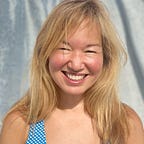Reinvent yourself
I keep meeting women who went to surf camp just before they got divorced, or quit a big job, or made some other kind of life altering decision. I’d done the same thing during the time I was pulling away from my husband after well over a decade of marriage. Long before embarking on my first surfing safari, I’d begun cultivating a life that didn’t include him. I was spending more and more time carousing with single friends at happy hours and late night parties that sometimes ended with me sleeping on someone’s couch because I was too inebriated to drive home. I’d become a late night regular at my favorite Adams Morgan bar where the bartenders wordlessly refilled my wine glass.
At the beginning of our marriage, I’d reveled in our domesticity. I prepared meals at home almost every night, paid our monthly bills, invested our money, registered our cars, planned our vacations, and managed every detail of our existence together. The first sign of marital deterioration was an empty refrigerator. We started eating out for almost every meal as I began to neglect the weekly grocery shopping. Maybe I was suffering from early onset mid-life crisis.
I’d casually mentioned my dream of learning to surf to a new girlfriend one evening over cocktails. Though my first serious boyfriend surfed, I’d never learned though I dressed the part, subscribed to Surfer magazine, and plastered my dorm room walls with posters of Tom Curren and other surfing stars of the late 80s. Within a week of introducing the idea, we found a surf camp in Costa Rica and booked our flights.
My husband and I had never vacationed apart. We traveled well together. Even when the end of the marriage was inevitable, we continued to plan trips together until the end, Berlin, Krakow, Vietnam. Our marriage was crashing on the rocks, though, by the time I announced my surfing plan. He did not try to dissuade me. I think he thought the trip would drive out the restlessness that had been stirring in me for a couple years. We’d finished graduate school and our careers were well established and upwardly mobile. We’d renovated two houses, hosted dinner parties, decorated a Christmas tree every year, and vacationed with other couples. I hadn’t done anything unpredictable in my adult life. Surf camp awakened me.
Surfing was much much harder than I thought it would be. I had imagined I’d be sliding down the face of waves higher than my head and shooting through barrels by the end of the week at surf camp. Instead, I spent most of those days popping up on baby waves that were mostly the whitewater leftovers from the real waves on the outside break. The physical challenge was addicting, though, and I vowed to conquer the sport. I returned to Costa Rica the following year to hone my skills and befriended surfers back home who guided me around the difficult east coast surf breaks. Learning to surf might have given me confidence to do even harder things, like leaving a long marriage.
The uncluttered lifestyle of surfing also appealed to me. The tide dictated the timing of surf sessions. Otherwise, there was no schedule to follow. We wore bikinis every day. My closets full of clothes and shoes back home seemed excessive. Sometimes I’d slip on a pair of flip flops to walk up the dirt road for an ice cream. There were two choices of beer, Imperial Lager or Pilsen. Beans and rice accompanied every meal. We gravitated toward either the Blind Dog or the Guilded Iguana at night, depending on which featured live music, to recap the best rides of the day and show off our bruises.
Surfing embodied freedom. Surfers lived their lives according to the natural laws of shifting tides and winds and strict surfing etiquette. Don’t drop in on another surfer. The surfer closest to the peak has right-of-way. Paddling surfer yields to surfer riding wave. Don’t ditch your board. Don’t be a snake. Contrived societal rules did not apply. Most of the American residents who’d made their home in the tiny Costa Rican beach town seemed to have fled or escaped someone or something they wanted to forget. Nobody asked questions and no one judged your past. The only thing that mattered was who you were in that moment. And in that moment, you could reinvent yourself into whoever you wanted to be.
